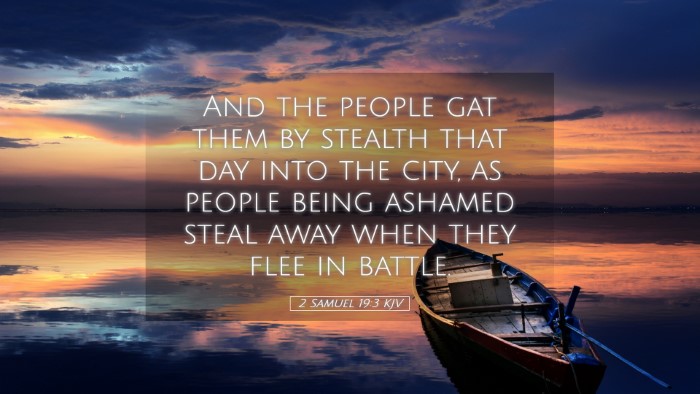Commentary on 2 Samuel 19:3
Verse Reference: 2 Samuel 19:3 - "So the people went by stealth that day, as people who are ashamed steal away when they flee in battle."
Introduction
The verse in 2 Samuel 19:3 carries profound implications regarding the emotions and circumstances surrounding King David’s return to power after the rebellion led by Absalom. This pivotal moment in Israel’s history encapsulates themes of shame, defeat, and the struggle for redemption. Through the insights gleaned from notable public domain commentaries, we will explore the multifaceted layers of meaning inherent in this passage.
Contextual Background
David's return was fraught with tension and complex human emotions. Absalom had usurped the throne, creating national turmoil. After Absalom's death, the feelings among the Israelites were mixed, reflecting both relief and guilt over the conflict. The deep grief of David for his son also painted a contrasting backdrop to the political landscape.
Exegesis and Insights
The Nature of Shame
Matthew Henry articulates the idea that the people’s stealthful retreat indicates a sense of deep-seated shame and guilt. They were reminded of the turmoil and bloodshed they participated in, which starkly contrasts with the typical triumphal return of a king. Their actions can be likened to the behavior of those who "steal away," highlighting their desire to avoid confrontation with David’s sorrow and the reality of their actions.
Albert Barnes expounds further by emphasizing the emotional and existential aspects of the Israelites' shame. The victory they had sought did not result in glory but rather in the mourning of the king. Their stealth was indicative of their hesitation and fear of reprisals for their past loyalties to Absalom. This moment encapsulated a pivotal transition from pride and rebellion to humility and penitence.
The Concept of Stealth in Communication
Adam Clarke offers a detailed analysis of the word "stealth," associating it with the thought that the people’s actions represented an internal struggle. They were not openly celebrating David's return; their demeanor was somber and reflective. Clarke highlights how this response is not merely a reflection of their physical actions but also their spiritual state. Unlike a traditional return from battle where victors march freely, the subdued nature of the people indicates a profound loss of confidence and an acknowledgment of their failures.
Thematic Elements
Redemption and Restoration
This passage speaks to the themes of redemption and restoration in the life of David and Israel as a whole. Despite the prevailing shame among the people, the return of David was also a moment filled with potential for healing and reconciliation. Rather than seeking vengeance, David embodied a spirit of grace, which is central to his character throughout his reign.
Application for Modern Believers
The emotional landscape painted in 2 Samuel 19:3 serves as a reminder for contemporary believers about the reality of failure, shame, and the hope of redemption found in Christ. Just as the Israelites had to navigate their feelings of guilt, modern Christians are often called to acknowledge their shortcomings while moving towards restoration in God’s grace. Pastors and theologians may find this recognition valuable while guiding congregations through moments of collective sin and the importance of seeking forgiveness.
Conclusion
2 Samuel 19:3 offers a poignant reflection on the consequences of sin, the complexity of human emotion, and the transformative power of grace. Through the analytical lenses provided by Matthew Henry, Albert Barnes, and Adam Clarke, readers are invited to delve deeper into the implications of this text, fostering a richer understanding of its theological and pastoral importance. Ultimately, this verse reminds us that while shame may lead to a stealthy retreat, there is always an opportunity for restoration and a return to grace under God’s sovereign hand.


